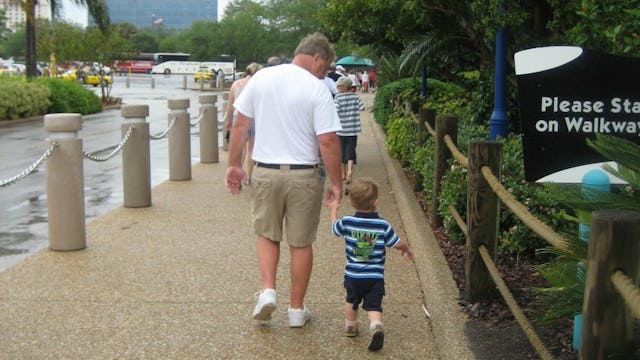The Most Difficult Thing About Alzheimer's Disease

“Boys! Stop throwing the ball. You’re going to break the window,” my dad says to my kids in a panicked, irritated voice.
“It’s okay, Dad,” I tell him, again. “It’s soft so the windows won’t break.” I try to say it as calmly and gently as possible, but there’s an irritated edge to my voice as well. I’m certain that I’ll remind my dad at least a dozen more times that it’s okay for my kids to throw the softball in the house, and I’ll remind my kids at least that many times to please stop doing things they know will irritate their grandpa.
“He can’t assess risk,” I’ll remind them, “so everything is scary.” I’ve tried to explain this, hundreds of times, but their child minds just can’t absorb it. Heck, my adult mind can’t fully absorb it either.
Last year, my dad was diagnosed with Alzheimer’s disease. It wasn’t necessarily a surprise — he’d been dealing with dementia for a while and we suspected this diagnosis was coming — but it was a gut punch nonetheless.
When people think about Alzheimer’s disease, they often think of the memory problems. But while it was unsettling when my dad didn’t know who my husband was, and it can be exasperating to answer the same question five times in as many minutes, the part that still knocks the wind out of me aren’t the memory problems or constant questions. The worst part about my dad’s Alzheimer’s disease doesn’t even have anything to do with me.
The worst part — the most painful part — is that my kids (and my nieces and nephews) are growing up without really knowing their grandpa.
They won’t know him as the independent and strong leader that he was, a man who started his own company and built it into an international powerhouse. They won’t hear the raucous, infectious laugh he got when he was around his brothers and sister. They won’t see him swimming, riding his bike, power-walking around the block with his tiny dog, Sammy. They won’t see the way his eyes lit up around his kids, and the way he practically glowed when talking about them.
They won’t know him.
They will know this new person that has been carved out by the mallets of the disease. They will know a person who gets scared and angry when they act like the boisterous kids that they are, jumping on the couch and throwing the ball in the house. They will know a person who is dependent and needy. They will know a man who laughs much less.
It isn’t all negative. They will also know a man who practically coos at his wife because he is still so in love with her. They will giggle when he swears and tells jokes inappropriate for their young ears. They will see a man who gets teary-eyed and emotional during daytime talk shows when the hosts talk about their parents because he misses his own parents so much.
And my kids will learn things too. Things that you can only learn when you are face-to-face with challenges, in the gritty day-to-day of the unforgiving beast that is Time. They will learn patience, how to take care of those who need it. Maybe they’ll even learn to calm down, as certain occasions call for that too.
My husband reminds me that our kids won’t just remember my dad through their own memories, but also through my memories of him.
“You can show them who their grandpa was by telling them about him,” he said one night not long ago. And I know that’s true.
Maybe after the dust has settled enough, I’ll be able to sift through this new reality and reconcile the man my dad was with the man he has become under the grip of Alzheimer’s disease. It is my role — my privilege actually — to share the man I knew my dad to be with my kids. And in that way, his grandkids will know him and the rest of us can hold on to him as well.
Alzheimer’s disease has been called the “long goodbye,” and that’s really about the most apt way of describing it. Because my dad is here, he is alive, but he’s not my dad. Not really, anyway. Not in the way he had been my dad for the first several decades of my life, and certainly not the dad I wanted him to be in these later years.
Every day, every encounter, is a goodbye of sorts. Goodbye to the person he was. Goodbye to the person he could have been. Goodbye to the plans and adventures he and my mom had planned to take in these golden years of their life.
Goodbye. Except not yet.
Because we’re not letting go.
This article was originally published on